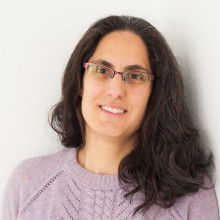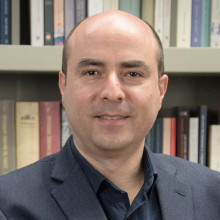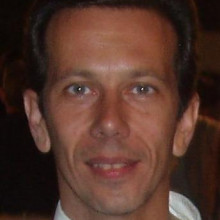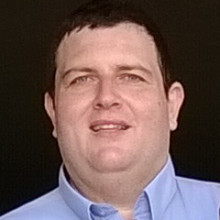
Education
- 2005, B.S., Engineering Sciences, Harvard University, Cambridge, MA, USA
- 2007, M.S., Biomedical Engineering, Boston University, Boston, MA, USA
- 2014, Ph.D., Physics, Center for Soft Matter Physics, Physics, New York University, NY, USA
Career
- 2014-2018, Post-doctoral scholar, Materials Research Laboratory (MRL) and Dept. of Mechanical Engineering, University of California - Santa Barbara (UCSB), CA, USA
- 2019-2020, Post-doctoral scholar, Max Planck Institute of Molecular Cell Biology and Genetics and Max Planck Institute for the Physics of Complex Systems, Dresden, Germany
Interests
- soft matter
- biomaterials / bioinspired materials
- polymer networks
- protein condensates
Awards/Prizes/Distinctions
- Max Planck Partner Group Leader, 2021 - present
- Springer Poster Award, 2019 European Polymer Congress for “Tough polymer networks with covalent and catechol-iron coordination bonds: correlation of binding stoichiometry with mechanical performance” by Filippidi, Palles, Cristiani, Eisenbach, Kamitsos
- Doctoral Thesis Award of the Circle of Hellenic Academics in Boston (2016)
- Alexander S. Onassis Foundation fellowship for four years of graduate studies (2009 - 2012)
- Eleni Gatzoyiannis Scholarship, Boston University (2007)
- Certificate of Recognition, Harvard Foundation for Intercultural and Race Relations (2005)
Dr. Minas M. Stylianakis is an Assistant Professor at the Department of Nursing of the Hellenic Mediterranean University. Since July 2020, he has joined the Hybrid Nanostructures group at the Institute of Electronic Structure and Laser (IESL) of the Foundation for Research and Technology (FORTH) – Hellas as a Research Scientist. He received his PhD degree in Chemistry, in 2015 from the University of Crete. His expertise lies in the synthesis, solution processing and characterization of novel universal carbon- and graphene-based materials, 2D materials, metal oxides and organic compounds (small molecules and polymers). His fields of interest include the development of biomedical and environmental applications, regenerative nanomedicine (drug-delivery systems, implants design/development and tissue engineering), self-healing and antimicrobial coatings, additive manufacturing and energy production and storage. He has published 56 articles in international peer-reviewed journals, 3 book chapters, one edited book, 3 peer-reviewed articles in conference proceedings and 2 laboratory manuals. To date, he has received 2235 citations (2118 non-self), with an h-index of 28 (Scopus 01/2022), (h-index 30, 2800 citations, Google Scholar 01/2022). He has presented his work in 4 invited talks in international meetings and in more than 50 times in international conferences. He also serves as Referee, Guest Editor and Editorial Board Member in high impact international scientific journals. Finally, he is a certified evaluator for the General Secretariat for Research and Technology (GSRT), Greece, since 2017.
Interests
- Biomedical and Environmental applications
- Regenerative nanomedicine and tissue engineering
- Self-healing polymers and composites
- Drug delivery systems incorporating 2D materials
- Biomimetic scaffold materials
- Self-healing polymers and composites
- Additive manufacturing – 3D printing
- Water treatment technologies (desalination, wastewater treatment)
- 2D materials treatment with polymers, small molecules, biomolecules, metal atoms and heteroatoms
- Inks preparation for printed applications
- Optoelectronics, energy generation and storage applications
- Organic and perovskite solar cells
- Lubricants incorporating nanomaterials as additives

Prof Makris works on Methods and analogies related to condensed matter physics and photonics, with emphasis in four different areas: nonlinear optics in lattices, non-hermitian photonics and parity-time (PT)-symmetry, nanophotonics, and semiclassical laser physics for complex structures.
Education
- 2008, PhD in Theoretical Photonics, School of Optics and Photonics, University of Central Florida, Orlando (USA)
- 2002, B.Sc. National tecnhical University of Athens, Athens, Greece
Career
- 2015 - , Assistant Professor, Physics Dpt, Univ of Crete, Greece
- 2012 - 2015, Marie Curie International Outgoing fellow (MC-IOF) between Princeton University, USA and TU-Wien, Austria.
- 2011, Lecturer, Institute for Theoretical Physics of Vienna University of Technology (TU-Wien), Austria
- 2008 - 2010, Postdoctoral Researcher, Ecole Polytechnique Federale de Lausanne (EPFL), Switzerland


George Kopidakis received a B.Sc. in Physics from the University of Crete and a Ph.D. in Condensed Matter Physics from Iowa State University in 1995. After his graduate work at Ames Laboratory-Iowa State University, USA, he worked as a research assistant professor at the Center for Atomic-Scale Materials Physics (CAMP), Dept. of Physics, Technical University of Denmark. He then moved to Laboratoire Leon Brillouin (CEA-CNRS), Saclay, France, initially with an individual Marie Curie EC post-doctoral fellowship and later as a CNRS research associate. He was a research associate at the Physics Dept. and a visiting associate professor at the Dept. of Materials Science and Technology, University of Crete, where he was appointed assistant professor in 2003. He is also affiliated researcher at FORTH since 2005.
Interests
- Theory and modeling of materials
- Current activities include atomistic simulations with quantum and classical models for the structural, vibrational, mechanical, electronic, optical properties of amorphous and nanostructured materials, fundamentals and applications of localization and tra

Associate Professor Ioannis N. Remediakis, got his bachelor (1997), masters (1998) PhD (2002) degrees from the Department of Physics, University of Crete. His PhD research (simulations for alloyed semiconductor surfaces) was performed at Harvard University. Between 2002 and 2008, he held teaching and research appointments at the University of Ioannina, the Technical University of Denmark (DTU) and the University of Crete. In 2008, he joined Department of Materials Science and Technology, and shortly after he joined IESL as affiliated University Faculty Member.
Interests
- First-principles computer simulations for low-dimensional systems with applications to nano-chemistry (shape and properties of metal nanoparticles, heterogeneous catalysis) and nano-physics (two-dimensional semiconductors, nanostructured solids).
- Electronic structure theory.


